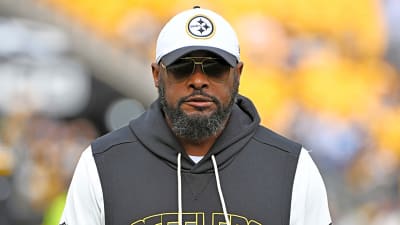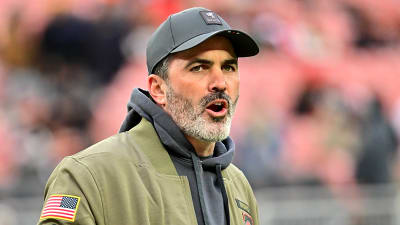- Home
- Quizzes
- My Quiz Activity
- Newsletters
- MY FAVORITES
- Add Sports/Teams
- SPORTS
-
NFL
- NFL Home
- Arizona Cardinals
- Atlanta Falcons
- Baltimore Ravens
- Buffalo Bills
- Carolina Panthers
- Chicago Bears
- Cincinnati Bengals
- Cleveland Browns
- Dallas Cowboys
- Denver Broncos
- Detroit Lions
- Green Bay Packers
- Houston Texans
- Indianapolis Colts
- Jacksonville Jaguars
- Kansas City Chiefs
- Las Vegas Raiders
- Los Angeles Chargers
- Los Angeles Rams
- Miami Dolphins
- Minnesota Vikings
- New England Patriots
- New Orleans Saints
- New York Jets
- New York Giants
- Philadelphia Eagles
- Pittsburgh Steelers
- San Francisco 49ers
- Seattle Seahawks
- Tampa Bay Buccaneers
- Tennessee Titans
- Washington Commanders
-
MLB
- MLB Home
- Athletics
- Arizona Diamondbacks
- Atlanta Braves
- Baltimore Orioles
- Boston Red Sox
- Chicago White Sox
- Chicago Cubs
- Cincinnati Reds
- Cleveland Guardians
- Colorado Rockies
- Detroit Tigers
- Houston Astros
- Kansas City Royals
- Los Angeles Angels
- Los Angeles Dodgers
- Miami Marlins
- Milwaukee Brewers
- Minnesota Twins
- New York Yankees
- New York Mets
- Philadelphia Phillies
- Pittsburgh Pirates
- San Diego Padres
- San Francisco Giants
- Seattle Mariners
- St. Louis Cardinals
- Tampa Bay Rays
- Texas Rangers
- Toronto Blue Jays
- Washington Nationals
-
NBA
- NBA Home
- Atlanta Hawks
- Boston Celtics
- Brooklyn Nets
- Charlotte Hornets
- Chicago Bulls
- Cleveland Cavaliers
- Dallas Mavericks
- Denver Nuggets
- Detroit Pistons
- Golden State Warriors
- Houston Rockets
- Indiana Pacers
- Los Angeles Clippers
- Los Angeles Lakers
- Memphis Grizzlies
- Miami Heat
- Milwaukee Bucks
- Minnesota Timberwolves
- New Orleans Pelicans
- New York Knicks
- Oklahoma City Thunder
- Orlando Magic
- Philadelphia 76ers
- Phoenix Suns
- Portland Trail Blazers
- Sacramento Kings
- San Antonio Spurs
- Toronto Raptors
- Utah Jazz
- Washington Wizards
-
NHL
- NHL Home
- Anaheim Ducks
- Boston Bruins
- Buffalo Sabres
- Calgary Flames
- Carolina Hurricanes
- Chicago Blackhawks
- Colorado Avalanche
- Columbus Blue Jackets
- Dallas Stars
- Detroit Red Wings
- Edmonton Oilers
- Florida Panthers
- Los Angeles Kings
- Minnesota Wild
- Montreal Canadiens
- Nashville Predators
- New Jersey Devils
- New York Islanders
- New York Rangers
- Ottawa Senators
- Philadelphia Flyers
- Pittsburgh Penguins
- San Jose Sharks
- Seattle Kraken
- St. Louis Blues
- Tampa Bay Lightning
- Toronto Maple Leafs
- Utah Mammoth
- Vancouver Canucks
- Vegas Golden Knights
- Washington Capitals
- Winnipeg Jets
- NCAAF
- NCAAM
- Olympics
- Boxing
- Entertainment
- Lifestyle
- Golf
- MMA
- Soccer
- Tennis
- Wrestling
- Sports Betting
- More Sports
- RESOURCES
- My Account
- YB on Facebook
- YB on Twitter
- YB on Flipboard
- Contact Us
- Privacy Policy
- Terms of Service

The last winless team from the past 30 NFL seasons
The Bengals and Dolphins each remain winless, making this season the first with two 0-6 teams in six years. (The Bengals are now 0-7.) But there have certainly been several starts worse than these. Here are the final winless teams from each of the past 30 seasons.
The last winless team from the past 30 NFL seasons
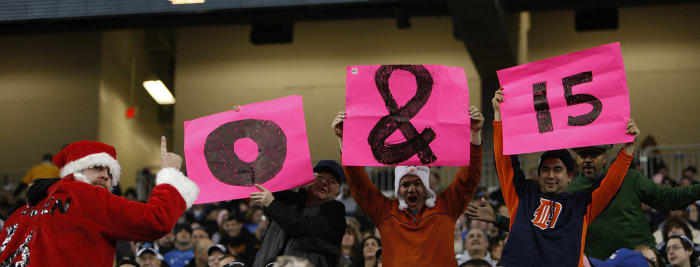
From two winless operations to teams that were beginning a successful rebuild, the NFL has seen different types of teams reside as a season's final winless squad. Here are the final winless teams from each of the past 35 NFL seasons.
2023: Carolina Panthers
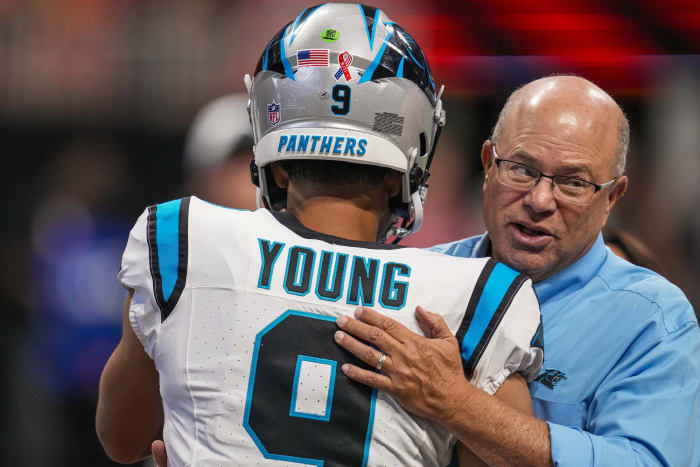
Although Frank Reich and Bryce Young could be seen leading this overmatched operation, most of the wrath at the Panthers' tumble went toward owner David Tepper. Viewed as behind the team trading up for Young and not C.J. Stroud — the QB Reich was believed to covet — Tepper has been the constant as the franchise has trended downward. The Panthers, who equipped their 5-foot-10 QB with a bottom-tier skill-position corps and a suddenly shaky offensive line, started 0-6. Reich handed play-calling reins to OC Thomas Brown in Week 8, and the team beat Stroud's Texans. Amid a 2-15 season, Carolina lost its next six and made Reich the shortest-tenured coach in 45 years (11 games).
2022: Houston Texans
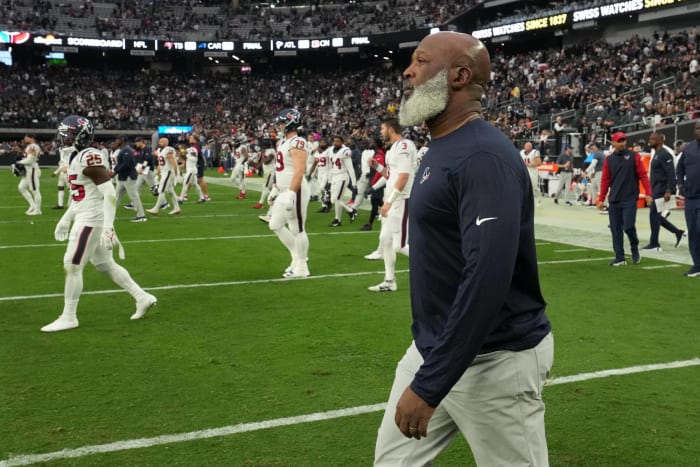
The Texans opted to tread water during Nick Caserio's first two years as GM. In 2021, the team made embattled QB Deshaun Watson a healthy scratch throughout. But Caserio still fired his head coach (David Culley). In 2022, the Texans traded Watson to the Browns for a bounty. While the team made two first-round picks, 2022 produced one fewer win. Houston tied Indianapolis in Week 1, with HC Lovie Smith taking heat for accepting a draw, but started 0-3-1. The NFL did not produce a lengthy season-opening skid in 2022; the Texans beat the Jaguars in Week 5. The team still went 3-13-1, and Smith followed Culley out the door.
2021: Detroit Lions

The Lions gave Dan Campbell a six-year contract, doing so knowing Matthew Stafford had requested a trade. GM Brad Holmes did not know of Stafford's trade request when he took the job, but the Lions began to build for the future immediately by trading their 12-year starting QB. In Holmes-Campbell Year 1, the team took its lumps. The Lions started 0-10-1, the tie coming after a Ben Roethlisberger COVID-19 contraction moved Mason Rudolph into the fray at the 11th hour. The Lions snapped their skid in Week 13, with a Jared Goff strike to Amon-Ra St. Brown toppling the Vikings in Detroit. The Lions went 3-13-1, but they laid a successful foundation for a climb.
2020: New York Jets
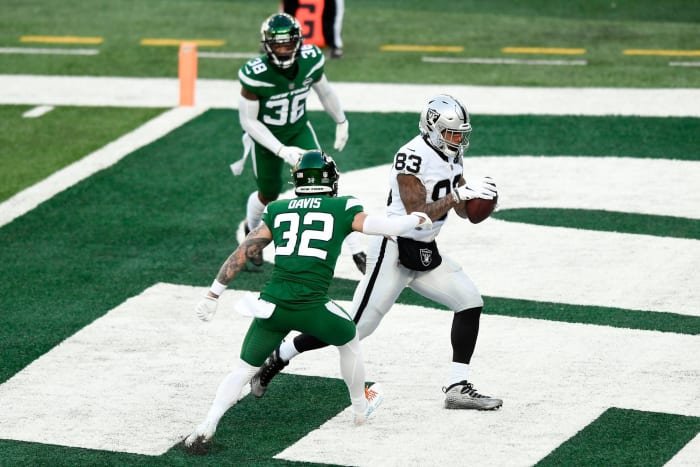
Depending on how Trevor Lawrence's career unfolds, this Jets season could be scrutinized for a while. It skidded off the rails from the start. The Jets started 0-13, lost eight of those games by double digits and finished a historically bad minus-214 in point differential. They infamously blew a last-second lead against the Raiders and fired Gregg Williams after the brash coordinator blitzed Derek Carr on the play that made Gang Green 0-12. The Jets did upset the Rams and beat a Browns team lacking most of its wideouts due to COVID-19. This cost them Lawrence, with a committed Jaguars team losing 15 straight games to secure the 2021 top pick.
2019: Cincinnati Bengals

As shown later on this list, Bengals management can be quite patient. Zac Taylor ultimately rewarded that faith, but his win-loss record was in a bad place through two seasons. It began after the young head coach started his career 0-11. The Bengals bottomed out despite rostering numerous veterans, though A.J. Green missed the entire season. Taylor benched Andy Dalton after Week 8, but rookie Ryan Finley was worse, leading Dalton back into the lineup. The nine-year Cincy starter led the team into the win column, via 22-6 win over Adam Gase's Jets, but this 2-14 season spelled the end for Dalton in Ohio and brought Joe Burrow back home.
2018: Arizona Cardinals
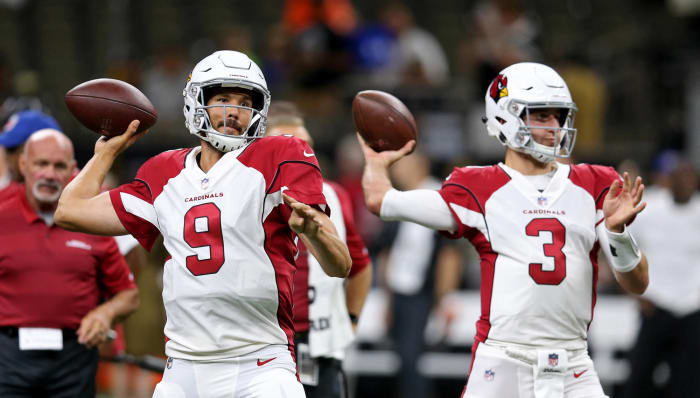
En route to the 2019 No. 1 overall pick, the Cardinals were the NFL's lone 0-4 team in 2018. While that is not especially bad, historically speaking, the Cards made their case for one of the worst offenses — adjusted for era — in league history. After Sam Bradford's first two starts ended with Arizona's point differential at minus-54, Josh Rosen made his debut. The first-round pick was unable to muster much behind a horrendous offensive line, and the Cardinals finished last in scoring and total yards. Steve Wilks became the franchise's first one-and-done coach in 66 years, and the next HC — Kliff Kingsbury — traded Rosen after drafting Kyler Murray.
2017: Cleveland Browns

In Year 2 of the Sashi Brown-led mega-rebuild, the Browns finished what they couldn't in 2016 by becoming the second team to go 0-16. Hue Jackson's bunch did not boast an abominable point differential (minus-176), but this was an ugly season. It also marked the end of Joe Thomas' Hall of Fame career. Cleveland's quarterback situation was brutal. Second-round rookie DeShone Kizer started 15 of the Browns' 16 games and threw 22 interceptions; he never started another game. No Browns wideout surpassed 400 yards in 2017, and Jimmy Haslam fired Brown that December. But after canning replacement John Dorsey in 2020, the owner hired Brown lieutenant Andrew Berry as GM.
2016: Cleveland Browns

The Brown and Jackson setup was misshapen from the start, with the old-school coach and the inexperienced analytics decision-maker clashing. This led to the Browns passing on Carson Wentz in the 2016 draft and avoiding Deshaun Watson a year later. The Browns also let high-end free agents Mitchell Schwartz and Alex Mack walk, setting the stage for a brutal year. Robert Griffin III, Josh McCown and rookie Cody Kessler started games for Cleveland, which began 0-14. A Week 16 home win over the Chargers prevented a winless slate, but the Browns' 1-31 two-season stretch will stand out as long as the NFL exists.
2015: Detroit Lions
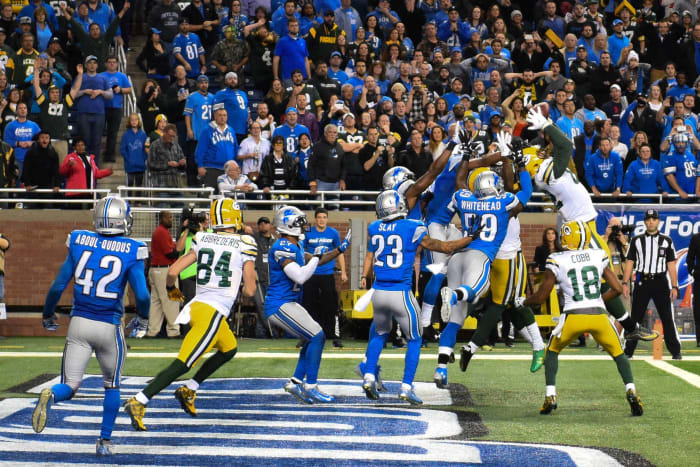
Both the 2014 and '16 Lions made the playoffs, but in between, Jim Caldwell's bunch started 0-5. Caldwell kept his job through the 2017 season, but this 0-5 start meant offensive coordinator Joe Lombardi's ouster. Then-31-year-old Jim Bob Cooter took over and helped Matthew Stafford to a strong finish. However, this Lions season may be best remembered for Aaron Rodgers' Hail Mary winner at Ford Field and as the year an injury-plagued Calvin Johnson hung up his cleats. The Lions ended up finishing 7-9 in 2015 and kept their coaching staff in place through 2017. Caldwell was fired after Detroit's 9-7 2017 season.
2014: Oakland Raiders

The 2010s Raiders named consecutive Broncos defensive coordinators, Dennis Allen and Jack Del Rio, to their head coaching post. Allen could not turn the Raiders around and was fired early in his third season, 2014. Allen's replacement, the late Tony Sparano, oversaw the rest of Oakland's 0-10 start. This was the first season of the Khalil Mack-Derek Carr draft class, though GM Reggie McKenzie did not have much around those talents yet. The Raiders beat the Chiefs on a November Thursday night, but a strange fourth-quarter celebration sequence nearly cost them that game. Oakland finished 3-13.
2013: Jacksonville Jaguars, Tampa Bay Buccaneers

Both the Jaguars and Buccaneers began this season 0-8, marking it the only time two teams have started that poorly this century. Jacksonville used Chad Henne at quarterback after its failed Blaine Gabbert pick. The Jaguars were record 28-point underdogs in a Week 6 game in Denver. (They did cover that, at least.) After a 2-14 2012 record, the Jags finished 4-12 in Gus Bradley's first year. They drafted Blake Bortles in 2014. Tampa Bay axed two-year HC Greg Schiano after this season, which also featured a 4-12 record. The Bucs made a splash by trading their 2013 first-round pick for Darrelle Revis. The star cornerback played just one season in Tampa.
2012: Cleveland Browns
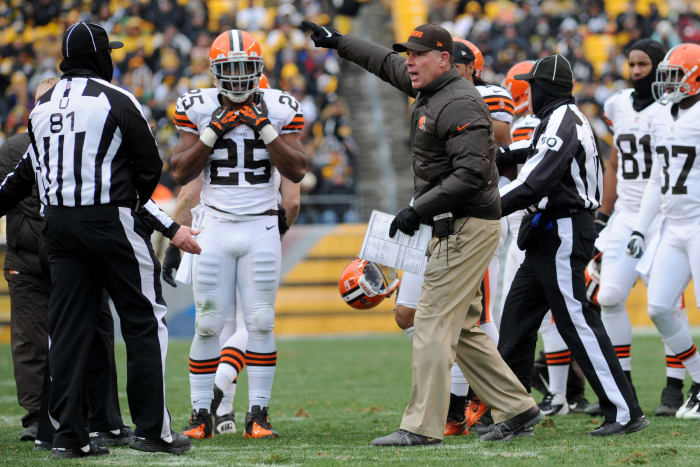
This season, which began with an 0-5 record, marked the end of Pat Shurmur's two-year Cleveland run. The Browns spent the next several years in chaos. Jimmy Haslam bought the Browns in 2012 and fired Shurmur at season's end. The Browns under Haslam have had seven head coaches and six GMs. In 2012 Cleveland took a shot on another first-round quarterback — Brandon Weeden — and traded four picks to Minnesota to move up one spot for Trent Richardson. Neither was long for Northeast Ohio. All-Pros or future All-Pros Joe Thomas, Josh Gordon and Mitchell Schwartz were on this team, which finished 5-11.
2011: Indianapolis Colts

A season that featured zero Peyton Manning games does well to help his "greatest ever" case. The Colts had won 10-plus games from 2002-10; they started this season 0-13 without Manning, who missed 2011 because of a neck injury. The low point came when Drew Brees' Saints walloped the Colts 62-7 on "Sunday Night Football." The previous power structure of Bill Polian and Jim Caldwell was fired at season's end, leading to Ryan Grigson and Chuck Pagano's hires. The Colts used this 2-14 season to land generational prospect Andrew Luck at No. 1 overall, but Luck lasted only seven seasons.
2010: Buffalo Bills

An 0-8 start led to the franchise parting ways with former first-round pick Marshawn Lynch. Midway through this winless run, the Bills traded Lynch to the Seahawks. Months later, the "Beastquake" occurred and ignited Lynch's mid-career resurgence. The Bills snapped their skid by stopping a Lions game-tying two-point try in Week 10. Buffalo had hired Chan Gailey in 2010, but the Gailey- Ryan Fitzpatrick offense finished 28th in this 4-12 season. Despite longtime starters Kyle Williams, Paul Posluszny and Jairus Byrd playing on this team, Buffalo's defense also ranked 28th. Gailey and Fitzpatrick lasted two more seasons in Buffalo.
2009: St. Louis Rams, Tampa Bay Buccaneers

After the 2008 Rams went 2-14, first-year coach Steve Spagnuolo topped that with a 1-15 record. Both the Rams and Buccaneers started 0-7, the Bucs doing so after moving from Jon Gruden to the inexperienced Raheem Morris. The Lions' futility during this era obscured the Rams', but St. Louis was historically bad in '09 , losing by an average of 17.9 points. This was despite Steven Jackson rushing for 1,416 yards. (Spagnuolo later recovered as a coordinator in western Missouri.) Tampa Bay gave the keys to rookie Josh Freeman, who did outduel Aaron Rodgers in the team's first win. But the Bucs (30th offensively) started 1-12 and ended 3-13. Freeman lasted five seasons in Tampa.
2008: Detroit Lions

The low point of a decade that sank the Lions from fringe contender to the NFL's worst team is undisputed. Detroit made the playoffs six times from 1991-99, but Matt Millen's GM tenure did not go well and ended early during the NFL's first 0-16 season. Rod Marinelli rebounded to become a respected defensive coordinator, but the then-third-year Lions head coach's team ranked last defensively. The Lions gave three QBs at least four starts, including Daunte Culpepper, and went winless despite Calvin Johnson's 1,331-yard season. Producing a minus-249 point differential, Detroit used the 2009 No. 1 pick on Matthew Stafford in 2009.
2007: Miami Dolphins
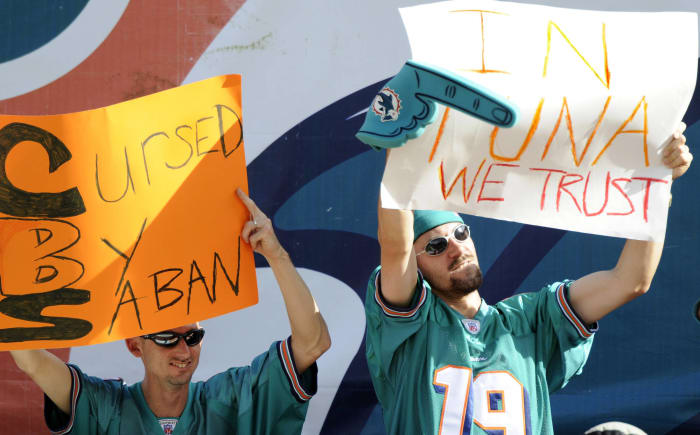
While Steve Spagnuolo received two more seasons after his tenure started 1-15, Cam Cameron did not. The Dolphins entered 2007 in a bad spot, when Nick Saban ditched them for Alabama after two seasons. They gave the job to Cameron, previously the Chargers' OC, but started 0-13 that year. A Cleo Lemon-to- Greg Camarillo 64-yard overtime walk-off in Baltimore gave Miami its only win. Lemon and rookie John Beck were called to action after another scary Trent Green concussion. The Dolphins hired Tony Sparano as head coach in 2008. He and Chad Pennington guided the Fins to the AFC East title.
2006: Detroit Lions, Oakland Raiders, Tennessee Titans

Marinelli's first Lions season provided an unfortunate prelude, with the Lions joining the Raiders and Titans as 0-5 teams. The Raiders rehired Art Shell, after a shaky coaching search, and their '06 offense looked noticeably outdated during the 0-5 start. Tennessee ended its 10-year Steve McNair era and drafted Vince Young. After the 0-5 start, Young got the Titans to 8-8 and won Offensive Rookie of the Year honors. The Young-piloted '09 Titans also went 8-8 after an 0-5 start. Jon Kitna quarterbacked Detroit to a 3-13 record. Of these teams, only the Raiders fired their coach. They went 2-14 in '06 and saw Randy Moss give noticeably more effort for his 2007 employer.
2005: Houston Texans

An 0-6 start left the Texans buried, and by December their players were having to answer Reggie Bush-related questions. The Texans were accused by some of tanking for the eventual Heisman Trophy winner, but those accusations aged oddly when the new-look Houston front office shocked the NFL by taking Mario Williams at No. 1 in 2006. The '05 Texans snapped their win drought with a 19-16 victory over the Browns but finished 2-14. The franchise's first coach, Dom Capers, was fired at season's end. Replacement Gary Kubiak gave David Carr one more season, but the Texans moved on to Matt Schaub in '07.
2004: Miami Dolphins
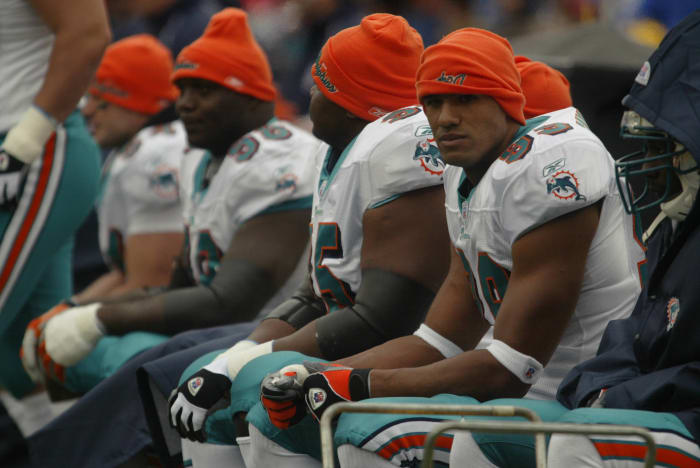
The Dolphins have some experience in this department, even if their past slow-starting teams were not as ill-equipped as 2019's. The 2004 Dolphins began 0-6, and this led to fourth-year coach Dave Wannstedt resigning after nine games. This season brought the end of the Jay Fiedler experiment as well. Hall of Famers Jason Taylor and Junior Seau (and Pro Bowlers Zach Thomas, Sam Madison and Patrick Surtain) played on this defense. It ranked 20th but could not elevate a woeful offense in a 4-12 season. The Dolphins hired Nick Saban in 2005. That also ended badly.
2003: San Diego Chargers
This season changed the course of Chargers history. The 2003 team's 0-5 start brought doubts about Drew Brees' viability as a starter. Brees started in each of the Bolts' initial five losses and went 2-9 as a starter that season. The Chargers received a monster LaDainian Tomlinson season (2,370 scrimmage yards — fifth-most all time) but finished 4-12 in Marty Schottenheimer's second San Diego campaign. This led to the then-A.J. Smith-led front office drafting Eli Manning No. 1, which brought Philip Rivers to San Diego. The 2003 doubts about Brees eventually led him to New Orleans in '06. His 15-year Saints stay went better.
2002: Cincinnati Bengals

Bad Bengals starts were once commonplace. The 2002 Bengals opened 0-7. The Bengals took a major misstep in drafting Akili Smith third overall in 1999, and the historic bust left the franchise in quarterback purgatory by 2002. Jon Kitna's first Bengals season produced a 2-14 record, leading to Dick LeBeau's firing. The Bengals beat the expansion Texans 38-3 in Week 9 but lost their next six. Both Corey Dillon and Chad Johnson excelled, but Cincinnati's defense ranked last. In 2003 the Bengals hired Marvin Lewis, who became the longest-tenured coach in team history. They used the 2003 No. 1 pick on Carson Palmer.
2001: Detroit Lions

The beginning of the Lions' modern-day downfall. Detroit went 9-7 in 2000 and brought back most of its cast, only new coach Marty Mornhinweg started 0-12 in 2001. After early blowouts, the Lions lost seven straight games by one score. During this stretch, Mornhinweg deferred an overtime coin toss in a loss to the Bears. The Lions' struggles prompted monologue jokes from Jay Leno, who drew ire from Detroit WR1 Johnnie Morton. After the Lions' Week 14 win over the Bears, however, Leno had Morton on "The Tonight Show." The Lions finished 2-14. A longtime NFL OC, Mornhinweg owns a 5-27 head coaching record.
2000: San Diego Chargers

The Colts choosing Peyton Manning first overall in 1998 provided a fork-in-the-road moment for two AFC teams. The Chargers' ensuing Ryan Leaf pick led to a rough patch. In 2000, Leaf started his final nine games as a Charger. The Bolts began 0-11 and needed a 52-yard John Carney go-ahead field goal to beat the Chiefs, who were starting a 44-year-old Warren Moon, to avoid a winless slate. Chargers ownership gave HC Mike Riley a third season but fired him after the '01 season. Although they acquired the No. 1 overall pick, the Bolts traded down from the Michael Vick slot and drafted LaDainian Tomlinson. So something good came out of this.
1999: Cleveland Browns

The expansion Browns were not expected to be competitive, and they weren't. Browns 2.0 began its tenure 0-7, losing five of those games by double digits. Their first win, a 21-16 conquest in New Orleans, came when No. 1 overall pick Tim Couch's Hail Mary found fellow rookie Kevin Johnson, eliciting giddiness from play-by-play veteran Don Criqui. But the Browns also lost their final six games. The expansion draft-filled roster did not improve much in 2000, with those Browns producing an even worse point differential than 1999's 2-14 team. Cleveland did make the 2002 playoffs, however, but that was a notable aberration.
1998: Carolina Panthers, Washington

These teams paired up earlier in 1998, with Carolina trading two first-round picks for franchise-tagged Washington defensive lineman Sean Gilbert. Both squads started 0-7. Carolina's first-round Kerry Collins investment went south, with the future Super Bowl quarterback starter battling substance-abuse issues. The Panthers waived him that October and turned to veteran Steve Beuerlein. Carolina finished 4-12, wasting a 15-sack Kevin Greene season. Washington turned its QB reins over to ex-eighth-rounder Trent Green, who enjoyed a breakout year in helping the team rally to 6-10. He left in 1999 free agency.
1997: Indianapolis Colts

Beginning a trend of timing their disastrous seasons incredibly well, for draft purposes, the Colts went from back-to-back playoff berths in 1995-96 to 0-10 in '97. Jim Harbaugh led Indianapolis to those AFC brackets, but his most notable 1997 moment came when he punched the recently retired Jim Kelly in the face after comments the Bills legend made about him on a Buffalo-area TV show. Harbaugh broke his throwing hand in the fight and was gone by 1998. This 3-13 season, which led to Lindy Infante's firing, did involve Marshall Faulk and Marvin Harrison. It also positioned the Colts to draft Peyton Manning.
1996: Atlanta Falcons, New York Jets
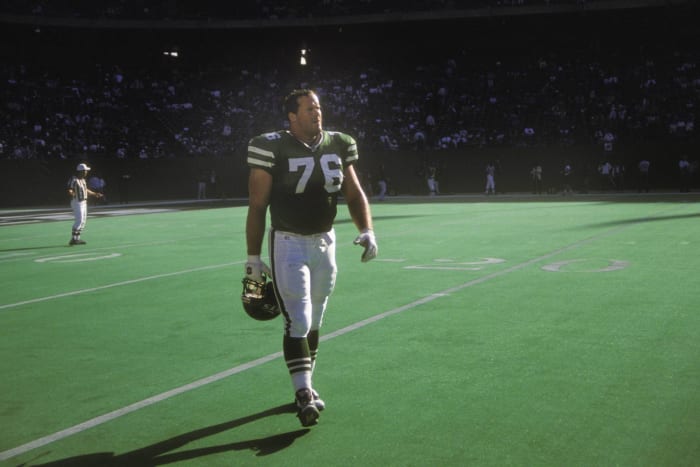
Manning's first NFL chapter came after the Jets' 0-8 start in 1996. While both the Jets and Falcons went 0-8, the Jets' 1-15 final tally gave them the 1997 No. 1 pick. Manning considered leaving Tennessee after his junior year but returned to school. The Jets traded out of the '97 No. 1 slot (Hall of Famer Orlando Pace) and took linebacker James Farrior. The team fired Rich Kotite after his one-win season, replacing him with Bill Parcells. The Falcons canned June Jones after his third season, which ended 3-13. The most notable part of that season: Jones suspending starting QB Jeff George for the season after a September sideline argument.
1995: Carolina Panthers, New Orleans Saints

Then members of the NFC West, the future NFC South rivals limped to 0-5 records. The Saints lost four one-score games, including an overtime defeat against the Falcons. Although New Orleans won five of its next seven, Jim Mora's team could not overcome this start and finished 7-9. This was the second of Jim Everett's three Saints seasons, but the ex-Ram quarterback was in decline. The Saints fired Mora during the '96 season. Carolina, a 1995 expansion team, also lost in OT to Atlanta that September and also rallied for a 7-9 mark. Dom Capers and Kerry Collins had the Panthers in the NFC title game a year later.
1994: Cincinnati Bengals

By 1994, the David Shula-David Klingler partnership had run its course, though the Bengals kept the third-year coach-quarterback duo around after this rough season. The second-generation coach and the former first-round QB did not turn the tide in Cincinnati. Klingler's final seven NFL starts came during the Bengals' 0-8 slump in '94. Cincinnati's first win that year, a 20-17 OT triumph in Seattle, involved six field goals and a safety. The Bengals found a quarterback in backup Jeff Blake, who guided them to their only three wins that year and started until 1999. The Bengals fired Shula in 1996.
1993: Cincinnati Bengals

After making two playoff berths from 1988-90, the Bengals embarked on a near-15-year futility run. The early '90s represented the darkest stretch for Mike Brown's franchise. The Bengals' first post-Boomer Esiason season began with an 0-10 start, with heir apparent David Klingler starting 13 games and finishing with six touchdown passes while piloting a last-ranked offense. The Bengals went 3-13; their 10th loss came against Esiason's Jets. Cincinnati, which won three games in 1991 and five in '92, did not make the playoffs again until Marvin Lewis' third season (2005).
1992: New England Patriots
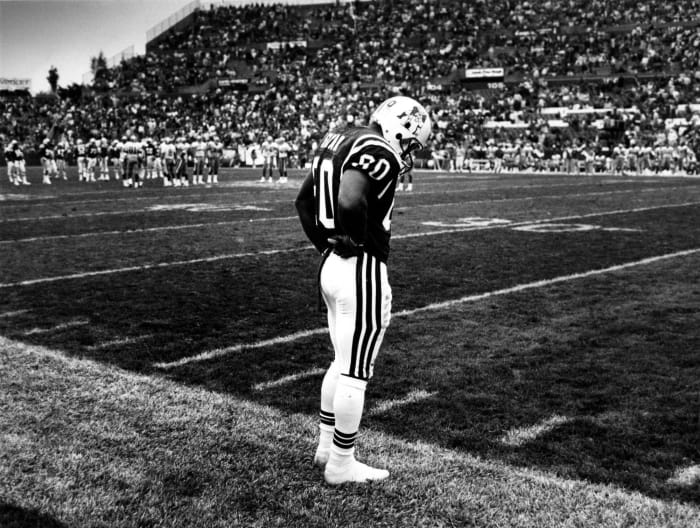
Between the Patriots' 1986 playoff appearance and Bill Parcells' 1993 arrival, lean years commenced. While their 1990 season was the low point, the Pats started 0-9 two years later. They eclipsed 17 points once during that losing streak, en route to a 2-14 season. Four quarterbacks — Hugh Millen, Scott Zolak (two wins), Tom Hodson and Jeff Carlson — started at least two games. The Patriots traded their top wide receiver, former No. 1 overall pick Irving Fryar (pictured), at season's end. This marked another prime-draining season for future Hall of Fame linebacker Andre Tippett and halted coach Dick MacPherson's Pats tenure after two years.
1991: Indianapolis Colts

Jeff George appears on another poor-starting team, with the then-second-year quarterback starting each game of a 1-15 Colts season. Indianapolis opened 0-9 and fired Ron Meyer midway through his sixth season. Interim coach Rick Venturi, who was later the interim HC when the Saints axed Jim Mora in 1996, led the Colts to a 28-27 win over the Jets in his first game in charge. George started 16 games and threw 10 touchdown passes — three in the Jets game. For 16-game starters, that total betters only four post-merger QBs. The Colts stuck with the former No. 1 overall pick for two more seasons.
Sam Robinson is a sportswriter from Kansas City, Missouri. He primarily covers the NFL for Yardbarker. Moving from wildly injury-prone sprinter in the aughts to reporter in the 2010s, Sam set up camp in three time zones covering everything from high school water polo to Division II national championship games
More must-reads:
- John Harbaugh reportedly broke news of joining Giants with epic line
- Doctors give Patrick Mahomes a clear timeline for return from knee injury
- The 'Most passes thrown by NFL season' quiz
Breaking News
Trending News
Customize Your Newsletter
 +
+
Get the latest news and rumors, customized to your favorite sports and teams. Emailed daily. Always free!
PRIVACY POLICY EDITORIAL POLICY CONTACT US
ABOUT YARDBARKER TERMS OF SERVICE
Use of this website (including any and all parts and
components) constitutes your acceptance of these
Terms of Service and Privacy Policy.
This site is for entertainment purposes only.
There is no gambling offered on this site.
Gambling Problem? Call 1-800-Gambler.




